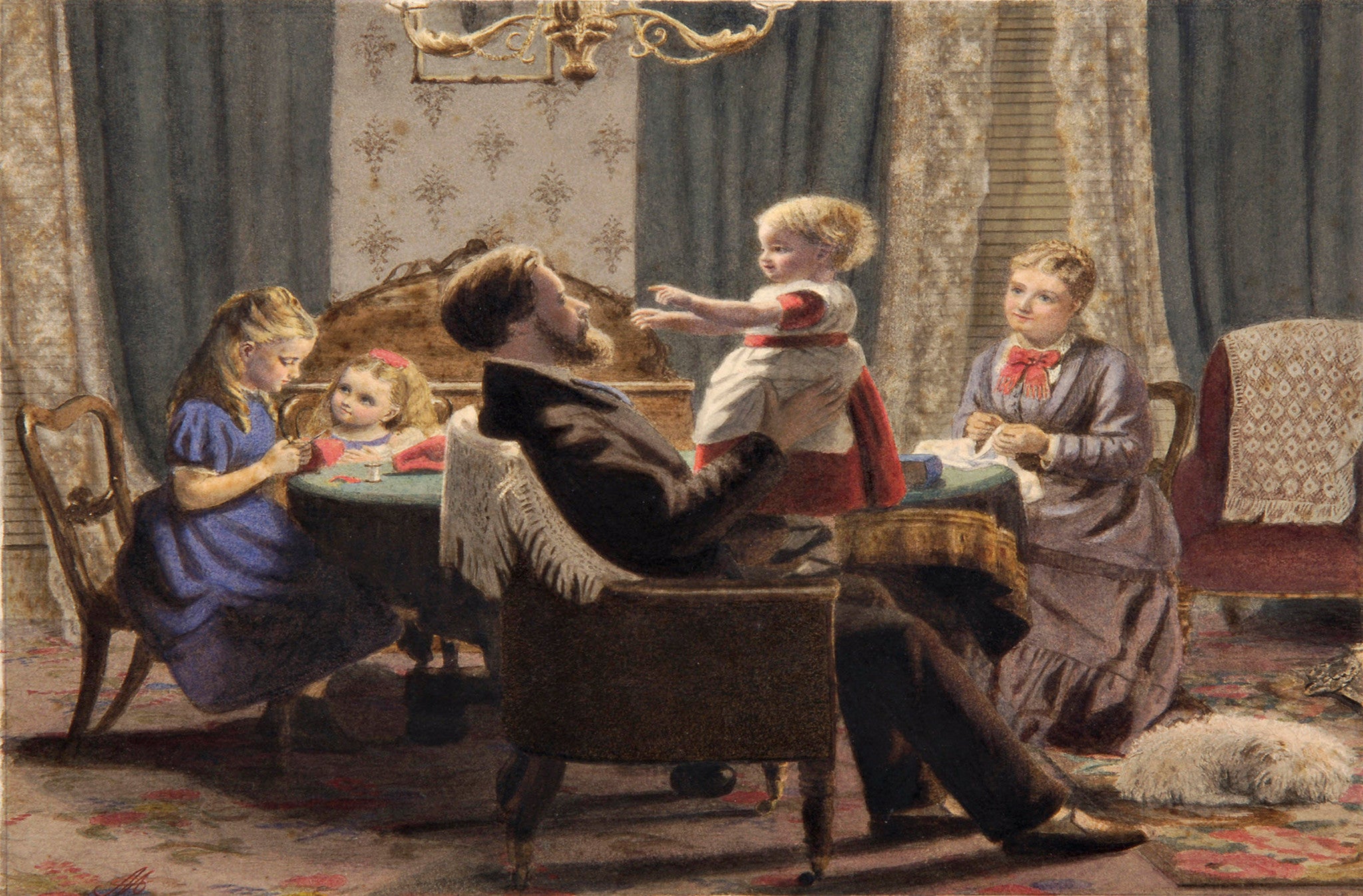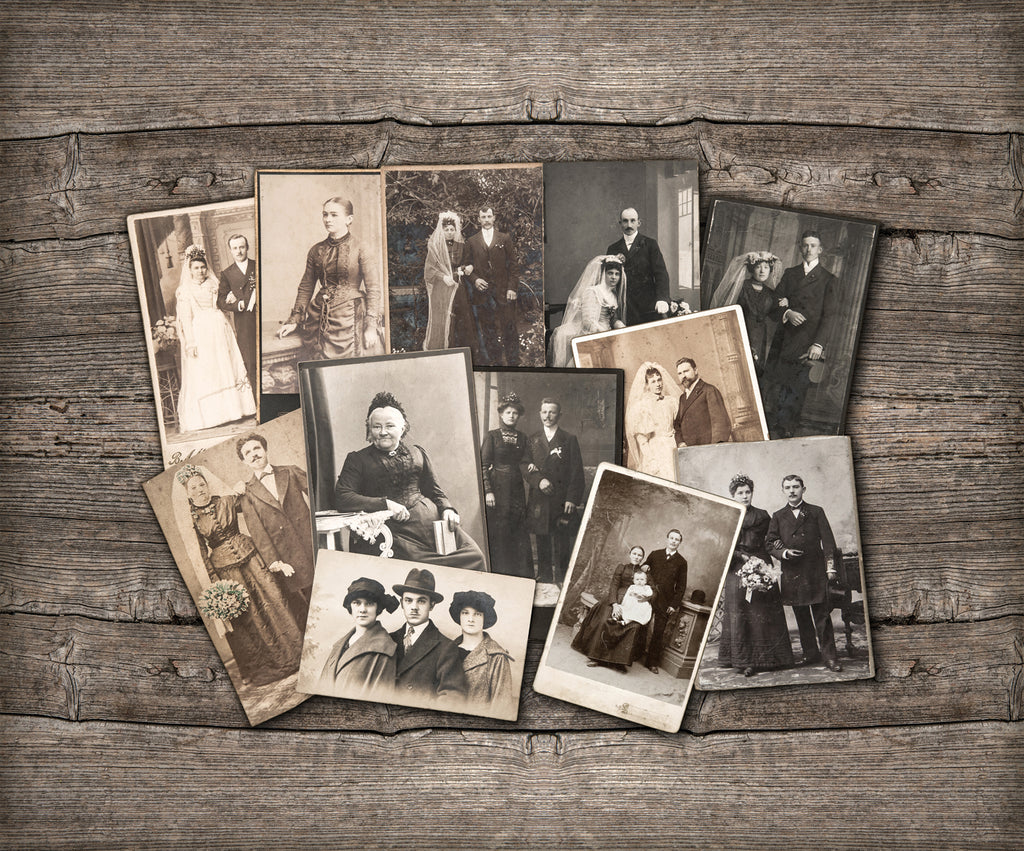In Defence of Prudery: Revisiting the Victorian Quest for Innocence

Photo: A Family in a Drawing Room 19C-Bonhams | www.commons.wikipedia.org/wiki/file:a_family_in_a_drawing_room_19C.jpg
In 1818, Dr. Thomas Bowdler published his landmark Family Shakspeare, the subtitle of which announced that ‘those words and expressions are omitted which cannot with propriety be read aloud in a family’.[1] By the mid-century it was the best-selling edition of the bard.[2] In the typical Victorian home, this (or one of its even more severely excised competitors) was the edition which would have been found on the library shelf.
Few nineteenth-century phenomena better embody that stereotypically Victorian ‘prudery’ than bowdlerism. And while the Victorians themselves have been largely rehabilitated from the ridicule they were subject to in the popular imagination for much of the twentieth century, the reason for that ridicule has not: their increased respectability has been achieved (perversely) at the expense of downplaying their moral conservatism, and in favour of highlighting the variability and paradoxes of Victorian culture.[3]
But as for that conservatism itself, especially with respect to public morals and sexuality, it remains an embarrassment—the word ‘bowdlerism’, after all, is only ever used pejoratively. Indeed, it continues to be seen as an awkward step backward in the grand liberal project of emancipation, a knee-jerk reaction against the progressive and free-wheeling eighteenth century, engendered by the unique stresses of the period—most importantly the catastrophic aftermath of the French Revolution.[4] While there is some truth to this picture, the Victorian concerns for the protection of innocence in fact emerged out of a mentality which was both more interesting and more complex than is usually acknowledged. More importantly, they offer potentially important lessons for early twenty-first-century Christians as we seek to strengthen marriages amidst the challenges of a sexually decadent culture.
An Ethic of Innocence
It is no caricature to say that concerns for a purified public space were central to Victorian morality. In fact, one may justly speak of an ‘ethic of innocence’ as a defining aspect of the culture of the period. A closer study of these concerns yields several observations. In the first place, they should be seen as continuous with long-standing efforts toward the ‘reformation of manners’, rather than as properly new: moral reform societies dated from the late seventeenth century, and gathered steam intermittently throughout the eighteenth.[5]
Secondly, these concerns cannot be described as primarily reactionary. There was certainly a conservative element, and clearly they gained strength from the reaction to the French Revolution, but they also drew from streams of liberal and Enlightenment thought. Tellingly, for example, the editors of bowdlerized works tended to be progressive and even Radical figures who wanted to make classic works available to the masses.[6] Thirdly, and most importantly, these concerns were rooted in a complex and inter-related set of beliefs ranging from the communal nature of morality to the moral purpose of the arts to the dangers of unmanaged emotions. Of these, two stand out as particularly significant: the malleable nature of character, and the uniquely elevated status of marriage and the family.

The Victorians inherited a view of human nature which saw moral traits as radically plastic. This meant that every book, every play, every conversation, indeed, every aspect of one’s environment, was viewed as contributing either positively or negatively toward the development of one’s character. While Locke (whose on-going influence on Victorian views of human psychology can hardly be overstated) had famously described this in terms of a ‘blank slate’, a more frequently used image was that of the garden: it will either grow weeds or flowers depending entirely on what is sown—and it will not grow nothing:
The mind is originally an unsown field, prepared for the reception of any crop; and if those, to whom the culture of it belongs, neglect to fill it with good grain, it will speedily be covered with weeds. [7]
‘Culture’ (it is easy to forget the derivation of the word) thus consists in implanting the right sorts of things and in keeping the wrong ones away.
Media in particular were viewed as having a decisive effect on the shaping of individuals and society, with Thomas Carlyle going so far as to argue that the influence of books and periodicals exceeded that of the pulpit, and likening their authors to a ‘priesthood’.[8] The controversy over the poems of Lord Byron in the first part of the century, virtually incomprehensible to modern readers, must be understood in this light: it was not merely that he was viewed as morally reprehensible, but as truly dangerous—one journal accused him of flinging ‘firebrands in sport’,[9] while Thomas Macaulay claimed that he had corrupted a whole generation with a defective ethical system.[10]
Alongside this, Victorian society increasingly came to adopt the veneration of marriage and family which had been characteristic of evangelicals since the Evangelical Revival in the eighteenth century.[11] Marriage was considered the greatest good of earthly life, and one out of which flowed all manner of other goods, both for individuals and society. It was the key both to personal happiness and societal order and progress.[12] Home and hearth were conceived of as the centre of a properly ordered life, and the joys of domestic peace as an antidote to seductive worldly pleasure. Marriage was thus both a source of moral and spiritual energy, and a prophylactic against temptation.[13] It followed that anything which undermined marriage was felt to be supremely dangerous—sexual immorality was thus singled out as especially pernicious.
Not Worth Knowing
It not surprising, given the strength of these two beliefs, that they should have resulted in an attitude of vigilance toward potentially corrupting influences.[14] There was an obvious practical dimension to this, and one which applied disproportionately to women, as any reader of Jane Austen will know: a young woman of good standing who fell into an illicit relationship was likely to see her future options dramatically and irretrievably curtailed. But there was also something much more profound going on—after all, it is unlikely that anyone believed that reading Shakespeare’s double-entendres would in itself make a girl ripe for seduction.
Instead, representations of sexuality which were coarse or which sanctioned immorality were seen to not only weaken resistance to vice, but also to sully the soul, to desensitise the conscience, and, ultimately, to dehumanise—debasing sex by divorcing it from its properly elevated context. Herein lay the justification for keeping certain sins hidden as much as possible, since the mere knowledge of them altered the moral landscape for the worse. When Lord Desart objected to a proposed provision in Parliament against lesbian acts, he expressed it in characteristically Victorian terms, even if the year was 1921:
You are going to tell the whole world that there is such an offence, to bring to the notice of women who have never heard of it, never thought of it, never dreamt of it. I think this is a very great mischief.[15]
Nor was the sense of loss from exposure to sexual sin limited to women. The mid-century novelist Charles Kingsley presents his love-struck protagonist reflecting on his earlier indiscretions in these terms:
How gladly... he would have welcomed centuries of a material hell, to escape from the more awful spiritual hell within him—to buy back that pearl of innocence which he had cast recklessly to be trampled under the feet of his own swinish passions![16]
In fact, one of the most fruitful ways of framing the changing norms of public morality in nineteenth-century Britain is as a kind of feminisation of society: the standards which had earlier been applied most forcefully to women came to increasingly be directed toward men as well. Thus Hannah More’s extraordinarily popular tracts at the turn of the century may be seen as a struggle to vanquish the ‘rough and bawdy’ masculine culture of the tavern with the ‘orderly domesticity and family discipline of the home’.[17] Revealingly, this was precisely the way that the rise of a purified tone was viewed by its detractors: William Thackeray lamented the fact that even satire had become ‘gentle and harmless, smitten into shame by the pure presence of our women and the sweet confiding smiles of our children’,[18] and Algernon Swinburne pined for a poetry that would not be ‘fit for the sole diet of girls’.[19]
Seen in this light, the censuring of sexual content for the purpose of protecting moral innocence was neither priggishness nor hypocrisy. The absurd characterization of Victorians as ‘anti-sex’ profoundly misunderstands their attitude. Not only did such influential writers as Kingsley and Coventry Patmore extol the raptures of wedded love,[20] but earlier, sterner moralists such as Sarah Trimmer and Henrietta Bowdler also paid tribute to the chaste joys of marriage, albeit in more veiled language.[21] Victorian public morality was indeed implacably, ferociously, pro-chastity. But undergirding this was a view of sexuality as fundamentally binary: it was necessarily either a very great good (in marriage) or a very great evil (in any other context). The Catholic philosopher Dietrich von Hildebrand offered a vivid description of this dichotomous vision of sex:
Sex only possesses the tender, mysterious, ineffably uniting and intimate quality when exercised as the expression of something more ultimate—namely, wedded love… Sex is always extraordinary, but its characteristic extraordinariness assumes diametrically opposite forms. At one time it is awe-inspiring, mysterious, noble, chaste, and free; at another, illegitimate, intoxicating and befogging... An entire world divides the extraordinariness of miracle from the twilight of magic, sinister and devilish... So it is, mutatis mutandis, with sex.[22]
This, of course, is not ‘prudery’. It evinces no fear of sex as such. But because it recoils from any representation of illicit sex, it is not surprising if it is made to wear the label.[23]
Learning from the Victorians
Contemporary evangelicalism is often uneasy with its historical associations with a more severe and moralistic kind of Christianity. Reacting perhaps to past excesses (and, for some of us, to our own upbringings) we are keen to emphasise our freedom in Christ when it comes to secondary matters. We are also sensitive to any perception of being seen as conventional or conservative when we believe that the Gospel is fundamentally radical and disruptive. And, of course, we want to focus our attention on the reality of redemptive grace, and the fact that no sin is beyond the transforming reach of the cross. Perhaps for these reasons we are uncomfortable placing too much stress on the question of what Christians should read and watch.

The example of our Victorian forebears should give us pause, however. They lived in a world where media were both much less pervasive and much less perverse, and yet were convinced of their own vulnerability to corruptive influences. In particular, they were convinced that for marriages to be wholesome, joyful, and productive, great care had to be taken to curtail exposure to sexual sin, both before and after marriage. We may not share their Lockean psychology, nor, in our post-Freudian world, ever be able to quite see sexuality as the discrete thing they did, yet they offer us a bracing reminder of the truth that the battle for sexual purity begins in the mind. It was not they, but Paul, who enjoined us to be ‘innocent of evil’ (Rom. 16:19) and to think on ‘whatever is pure, whatever is lovely’ (Phil. 4:8). It was not they, but our Lord, who commanded us to pluck out the eye that offends (Matt. 18:9).
Today we face both the privilege and the challenge of navigating a world with virtually unlimited options for the media which are available for us to consume. One lesson we can learn from nineteenth-century Christians is that the choices we make in this area are far from trivial. The standard which they often employed in judging a play or a book was whether or not it was ‘improving’, reminding us of Paul’s injunction that ‘all things are lawful, but not all things build up’ (1 Cor. 10:23). Adopting this principle for our lives might mean approaching our choices for media consumption somewhat like curators: each of us is charged, as it were, with the delicate and vital task of determining which images and words ought to fill the collection which is our mind.
In a society no longer avowedly Christian, it is perhaps not appropriate for us to engage in an all-out effort to purify the public space; surely, however, we should be seeking to purify our private ones.
[1] William Shakespeare, ed. Thomas Bowdler, The Family Shakspeare: In Ten Volumes; in Which Nothing Is Added to the Original Text; but Those Words and Expression are Omitted Which Cannot with Propriety Be Read Aloud in a Family (London, 1818). Thomas’s sister Henrietta had published an earlier, less complete, version of the Family Shakespeare, in 1807, but it met with considerably less success.
[2] Sales figures are difficult to come by, however the Family Shakspeare ran to eleven editions between 1818 and 1865, far more than any collected plays of Shakespeare (cf. William St. Clair, The Reading Nation in the Romantic Period (Cambridge, 2004), p712).
[3] The two seminal works in this regard were The Other Victorians, by Stephen Marcus (New York, 1967), and The Worm in the Bud, by Ronald Pearsall (London, 1969). Both were revisionist treatments exposing the seamy underside of Victorian respectability.
[4] Thus a recent work argues that by 1800 the Christian perspective on sexuality ‘had been replaced by a fundamentally different outlook’, before enjoying a revival in the early nineteenth century (Faramerz Dabhoiwala, The Origins of Sex: A History of the First Sexual Revolution (London, 2012), p350).
[5] When William Wilberforce wrote in his diary, on 28 October 1787, that God ‘has set before me two great objects; the suppression of the slave trade and the reformation of manners’ he was in the latter case consciously employing the terminology of the earlier Societies for the Reformation of Manners, with which he was well familiar (cf. M. J. D. Roberts, Making English Morals: Voluntary Association and Moral Reform in England, 1787-1886 (Cambridge, 2004), pp. 17-20).
[6] Thus both Leigh Hunt and Charles Lamb were reformist activists, and produced expurgated versions of classic works; Charles Cowden Clarke, who produced two bowdlerized editions of Chaucer, was associated with education for the working classes through mechanics institutes; and Elizabeth Macauley, who wrote purified prose versions of plays for children, was an Owenite social activist. Significantly, none of the major expurgated works in the nineteenth century were produced by evangelicals.
[7] Thomas Gisborne, An Inquiry Into the Duties of the Female Sex (London, 1797), p44.
[8] Marjorie Morgan, Manners, Morals and Class in England (New York, 1994), p40.
[9] [Reginald Heber], ‘Marino Faliero’, Quarterly Review Vol. 27 (1822), p516.
[10] [Thomas Macaulay], ‘Letters and journals of Lord Byron’, Edinburgh Review Vol. 53 (1831), p571.
[11] As Gordon Rupp observed, ‘the historians of the Evangelical Movement all stress that at the heart of it was the Christian home and family devotion’. Rupp, Religion in England 1688-1791 (Oxford, 1986), p483.
[12] Thus Henrietta Bowdler, writing in her very popular collection of sermons at the beginning of the century, described marriage as the institution to which ‘we owe the greatest blessing which this imperfect state affords’ (Sermons on the Doctrines and Duties of Christianity, pp24-5).
[13] ‘Let the cheerful tranquillity of domestic pleasures stand in the place of trifling and turbulent festivity abroad’. Thomas Gisborne, op.cit., p330.
[14] Thus John Wilson Croker, writing in the influential Quarterly Review, accused the French plays seeping into England of threatening the ‘universal dissolution of the principles of society’ (‘State of the French Drama’, Quarterly Review Vol. 51 (1834), p212) and Robert Southey charged Byron in the equally prominent Blackwood’s with seeking to ‘destroy the cement of social order’ (‘Mr. Southey’s Reply to Lord Byron’, Blackwood’s Vol. 11 (1822), p93).
[15] Ari Adut, On Scandal: Moral Disturbances in Society, Politics, and Art (Cambridge, 2008), pp43f.
[16] Walter Houghton, The Victorian Frame of Mind, 1830-1870 (New Haven, 1963), p381.
[17] Mitzi Myers, ‘Hannah More’s Tracts for the Times: Social Fiction and Female Ideology’. Mary Schofield and Cecilia Macheski (eds.), Fetter’d or Free? British Women Novelists, 1670-1815 (Athens, Ohio, 1986), pp264-284 at p271.
[18] Vic Gatrell, City of Laughter: Sex and Satire in Eighteenth-century London (London, 2006), p418.
[19] Algernon Swinburne, Notes on Poems and Reviews (New York, 1866), p23.
[20] See, especially, Charles Kingsley’s Yeast (1851) and Coventry Patmore’s The Angel in the House (1855) (Cf. Houghton, op.cit., pp375-381).
[21] Henrietta Bowdler never married, yet she was willing to write of how in Christian marriage God ‘bids us perform, for his sake, all those kind offices which even natural affection would lead us to perform for our own’ (p124).
[22] Dietrich von Hildebrand, In Defense of Purity: An Analysis of the Catholic Ideals of Purity and Virginity (1930; Pekin, Indiana, 2010), pp28f.
[23] More properly it may be termed ‘modesty’. Simon Szreter and Kate Fisher’s Sex Before the Sexual Revolution is a survey of early twentieth century sexual attitudes based on interviews. One of the principal strands in their findings was that their interviewees often focused on ‘the experience of initial marital innocence as joyous and exciting’, leading them to observe that these respondents ‘did not find themselves enjoying sex despite their ‘inhibited’ and private culture, but because of it’. Szreter and Fisher, Sex Before the Sexual Revolution: Intimate Life in England, 1918-1963 (Cambridge, 2010), p387.
Leave a comment
Comments will be approved before showing up.



